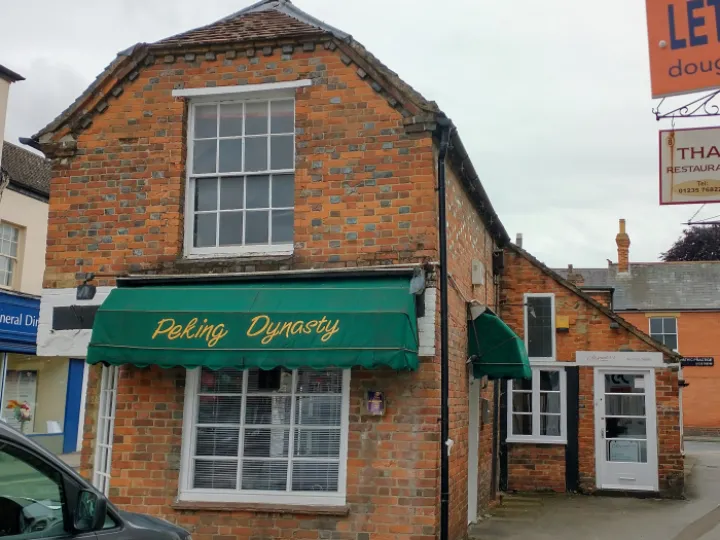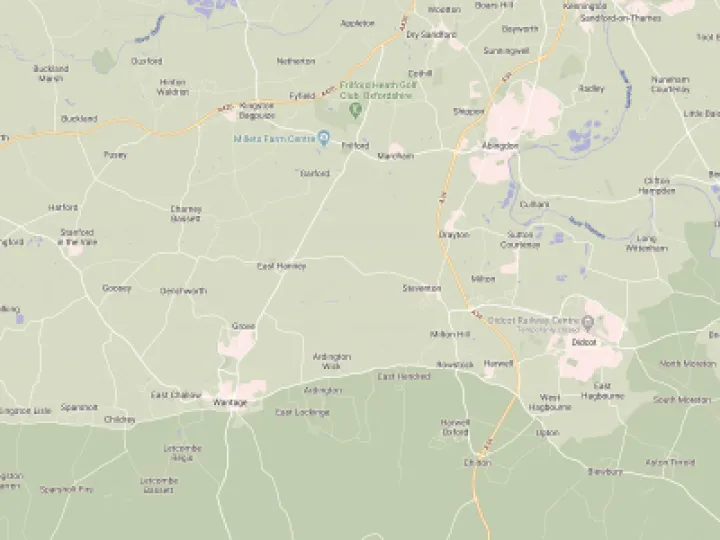King Alfred's Kitchen
King Alfred's Kitchen
By Veronica Sharley
As this is a longer piece about King Alfred's Kitchen (which occupied the building where the Chinese restaurant pictured now stands), which was opened and run by Penelope Betjeman (the wife of John Betjeman), the recording is split into two parts. The first is a general introduction to the cafe. The second has more stories from the cafe.
More information about Penelope Betjeman can be found here: National Portrait Gallery
More information about John Betjeman (mentioning the cafe) can be found here: Blue Plaques
The first recording can be heard here: King Alfred's Kitchen
The second recording can be heard here: Interview with Veronic Sharley
The text is as follows:[
]I'm Veronica Sharley. My mother was quite a good cook and Penelope needed someone to make her a sponge cake. And someone who worked out in the King Alfred's kitchen said, Mrs. Sharley makes a good sponge. And that's how it all started. My sister and I needed holiday jobs. And I think it was the age of about 11, 12, which I guess, now is probably bound to be illegal, but it was Saturdays, and we worked down there.
Wantage was one of the first places, I would think, outside of London or big cities, that had an espresso coffee machine because that's what it was in those days, you know, things, ain't what they used to be. It was coffee houses and we had frothy coffee, nobody else did. But we had a wonderful lady there who'd come to Wantage and she was one of Lion's House originals nippies – tea houses in London. In the Lion's corner house, I think they were called. So she was trained and she would always was in black. So she would train us kids up. So she sorted us all out.
They always did lunches and they had a lunch, which I think was most probably for about a pound – wasn't very much anyway. You had a main course and a pudding and they were for the office workers. They had this special menu. They chose what they wanted, and she did a cheaper sort of thing for them, which was usually their specials. Well, it did change daily the menu in as much that whatever was in season. It was always fish on Friday of some shape or form, because Penelope was a Roman Catholic. We would have certain people coming in at certain times, the girl that worked in the bank, we all had pet names for these people, but people came at various times.
They would come, but they would be on a sorta trip up to the White Horse. And where can you get some tea or something like that would come to go to King Alfred's Kitchen, and as I say, with Penelope – the people she knew and the people John knew and so on. So they didn't all come in together. We did have people queuing sometimes, but not all the time. So don't get me wrong. It always closed up for Thursday afternoon. That was also half day shopping in Wantage. And so that was the time when she would clean out the fish fryer or... It's now opposite the very old post office in Newbury Street. And it's now a Chinese restaurant. It was really a series of rooms with steps up and down and a lovely big fireplace in the middle. So it went between two rooms and that was lit during the winter months.
And that made, it, gave it a lovely atmosphere in there, and at the far end was the espresso coffee machine. By the side of that was this pulley lift thing that took you up that took the food up to the kitchen and was really quite small. I can't remember how many it actually took and the middle room with bench seats around tables. It was very intimate. When you think about it now, as large restaurants are, it had lovely pictures on the walls that were painted by David Tin, who was a local artist and taught, I think, at one of the schools and went on to help paint the mural in Longmead.
John always called it the caff. Are you going down to the caff? And they had huge sinks because we didn't have a dishwasher. You didn't have to have a dishwasher in those days. And underneath the sinks were buckets and all the scrapings, which there wasn't much would go into the bucket. And then they would be taken up to the Mead where they lived. And they were for the ducks. She called the Mead Water Fowl Farm. And as kids we would quite often had to take this blasted duck bucket up to the Mead, which we were frightfully embarrassed, 'cause we were in our teenage years. People used to look at you and you'd got the potato peelings in this stuff bucket, and as I say, people came from way over the place and we were on the American tourist board as a good teashop, sort of in a way, a bit like Betty's that we were King Alfred's Kitchen in a funny little place called Wantage, stuck at the foot of the White Horse.
And of course we had a lot of racing people as well, 'cause Lambourne was just up the road. Letcombe have race horses. We had the Grand National winners at Letcombe, we had about four. We woke up in the morning – we didn't have to have an alarm clock. There were about 50 racehorses going past every morning, but they would come down from Letcombe over the top and then walk along. But then people didn't have cars in those days, not to the extent that everybody has a car now. And because Lambourne didn't have a bank – Wantage had the banks. And so you would find famous racehorse people, Lestor Piggott, all of them in those days, actually in the town to come to the banks. So you'd have trainers, owners, all that sort of thing.
You always knew, which were the stable lads because they were all bandy and they were tiny, but they were a lot of them. And of course, Penelope was a great horse woman. She was a member of the hunt that used to go to the hunt and then get bored. And so go off on her own. She also had the beautiful carriages. Penelope would come here and she'd have the horse, and she'd say to someone who was going past, can you go and ring their doorbell or not? And knock on their knocker. Mother would go and there was Penelope and she'd be on a horse. And she would say, oh, I want a cup of coffee and we'd walk in. And sometimes we've got the horse as far as the front door or else she would have her cart and be outside. She liked it, but got bored quickly and then found somebody to run it for her. But at the time she loved it and all her friends, various friends would come and wash up.
John Betjeman and I used to spend hours at the sink. And especially on Saturday, John would come for lunch. Well you'll have to wash up. You used to make up ditties and that sort of thing. I used to put an apron around him, but he was quite plump in those days. And then of course we had this wretched bucket with the duck bucket, as it was always known as. We made up ice cream sundaes. We had a King Alfred's burnt special, which was ice cream, caramel, chopped pralines, which we used to make with hazelnuts, and cream.
Things would go down for someone for lunch. And then she would say, well, it didn't seem as though they had enough peas on there and she would disappear downstairs with this old battered saucepan and shovel out peas. And in the meantime, we're up in the kitchen trying to do these meals and saying well, where are the peas? Well, Mrs. Betjeman, 'cause that's how she was in those days to us, Mrs. Betjeman's gone down the stairs with them.
We didn't open on Sundays. We opened over Easter. We opened on public bank holidays. And that was when it was really busy. At one stage, the person that was running it was a 17 year old girl, which I think was my sister, One Saturday when they were really busy, we were responsible for running this place. And the oldest person was 17. We didn't have a license, an alcohol license, but I think people brought it in if they wanted to. And not many people did because we didn't open in the evenings. And then of course, because we had the tea shop at the bottom with all these cakes and things and fudge, which we made and rum truffles, which I still make today. People used to ask for orders.
We were always taking orders and she sold her eggs as well. Not only did she have her ducks, but she also had some chickens as well. So we sold eggs. If we hadn't got enough, I think we got some from a local farmer that she knew. So then we would take orders for Christmas cakes and Christmas puddings. And because the cafe was so busy during the week, it was decided that she would make the Christmas puddings on a Sunday at the end of October, beginning of November. So she comes in here and says to my mother, oh, I'll take Ron, which I was always known as, and we're going to make the Christmas puddings. And so we made all these puddings and in those days you steam them all up and all the rest of it, we had lots of orders and someone came in for their order and Penelope had put on it, genuine 'Sharley Junior made' and a friend of ours called the Bakers bought one and actually sort of said, oh my God, if Ron's been at it, what will it taste like? It was so good. They bought two more. You had to go back the following Sunday and make another lot.
She called my mother, the bug, and we were known as the bug family, but she would come in, literally walk in and push in between my mother, my father and I, and just help herself to whatever was there. And she wasn't invited. She used to just come. And then of course she would lecture to various people. She was a very highly intelligent woman. She spoke French fluently. I think it was Hindi she spoke too, or Italian. That's where she was brought up. Think her father was the Viceroy, but she didn't like that life. She loved the countryside. She loved the horses and so on. And I mean, she really was quite beautiful when she was younger. She didn't name drop at all.
Oh, she came up here one day on the Thursday afternoon and said to my mother, I want to clean the fish fryer. Will you come and help me? Mother said, alright then. So Mother goes down to find her by the drain in Newbury Street with a thing of vim, some boiling water and the fish fryer, which was quite a big sort of thing that you find in a small fish and chip shop. Mother said, what are you doing? She said, well, I'm emptying it. Well, we can't empty all down the, the drain. Well, I've already done it. She said, now I'm cleaning it. So now will you go get me some more boiling water? Then Mother said, if you think I'm going to stand out here, cleaning a fish fry with you, you can think, well, you're just a snob. That was what she said. You were just a snob. With that, Mother said, this huge car came out and said, hello, Penelope, what on earth are you doing? And she said, oh, I'm just cleaning the fish fryer and bug won't won't help me 'cause she's too much of a snob 'cause we are doing it in the street. And it was actually the Marquis of Bath. And he came out and stood with them and helped them. But that was how things were. Mother didn't know it was, she just called him by his Christian name and said, this is bug as poor old Mother was always called.
But you had no idea to be honest with you who you were serving in there sometimes. I remember John used to bring various people down and you'd suddenly think, 'oh God, that's so and so', but everybody was really fun. I mean, it was fun, we hardly got any money in wages, you know, I think I got a shilling an hour and then I was given a pay rise and it was a shilling and a ha'penny an hour, you know, we had our little wage packet and that's what we appreciated. Yes, I was 14 when I made the Christmas buddings. But that was a Penelope sort of thing that it was genuinely Sharley Junior made.
And of course you need to remember that around here, there was a lot of wealth, you know, you've got big houses, rather like Kingston Mile Park, Christopher Lloyd and all that sort of thing, and they were all her generation and she knew them. I mean, royalty used to come a lot to Ardington, so that's how they would come, and they would order cakes and things like that. They most probably wouldn't come into the restaurant or to the caff. And it was just formica tables and chairs. And she would go shopping in the town, in the pony and trap, and tie it up to a lamppost, but there was the traffic and you knew the tradespeople, but John used to go in his plastic mac and the wind used to get behind you and it used to fly out. But he went to Wantage church of course, and Penelope went to the Catholic church. That was the first time we ever knew them, long before King Alfred's kitchen. Well, there was this man that used to sit on his hat, who always came and sat with us, with us as a family, and we didn't know who he was.
After that, Penelope was on Woman's Hour due to that book, her love was India. She would go and take American tourists to India. And she did, in fact, always said to my mother that she wanted to die in India. And she came to see my parents the day, the evening just before she went on her last trip to India. And Mother actually said to my father, we won't see Penelope again. Did she die in India? Yeah. And in fact, it came through from Canada, their daughter and Dick rang Mother and said Penelope has died. And Mother said, where did she die? He said in India, Mother said her wish has been granted. And she had an Indian funeral.
I was very lucky in actual fact, the last time I saw John was about a fortnight before he died, and then he was buried in St Enodoc, which is in Cornwall, which is a tiny, tiny little church and it was a private funeral and it was only the sort of the real family. And I don't know whether, you know that part of Cornwall because St Enodoc Church is in the middle of a golf course. And when the wind blows, it blows. Well actually he was buried there, and they closed the golf course 'cause you have to go through the golf course to get to the church. And it was just, it was Force 8. And there were photographs of it actually in the Daily Telegraph of the wind going across.


